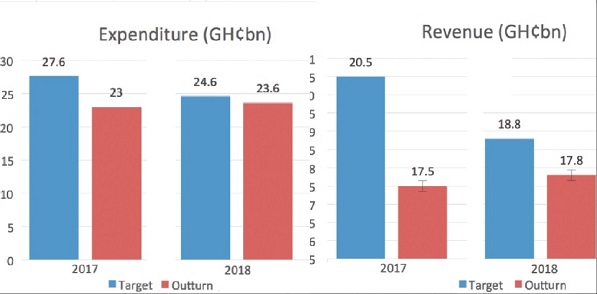
Tax more or spend less? - Revenue shortfalls give govt nightmare
Saddled with revenue shortfalls in the midst of rising expenses, the government is torn between cutting expenditure and risk strangling growth or raising more revenue through the introduction of new or increasing existing taxes in an economy that is projected to expand by 6.8 per cent.
the first five months of the year prompted a GH¢2.2 billion cut in public expenditure.
But unlike the 2017 Mid-Year Budget Review (MYBR), which announced a corresponding GH¢1.4 billion drop in the year's revenue target, the Finance Minister, Mr Ken Ofori-Atta, will use this year's review to announce a combination of measures that will seek to boost revenue inflows and prune expenditure downwards in a manner that will still keep the deficit at the budget target of 4.5 per cent of GDP.
While new tax measures are expected to yield some GH¢2.9 billion in additional revenue, the value of expenditure cuts is still unknown but could be within GH¢1 billion.
In an interview, a professor of Economics, Prof. Peter Quartey, explained that any expenditure cut should be properly targeted to ensure that it does not stifle growth.
“If expenditure on productive sectors is cut, then certainly that will have a negative effect on growth,” he told the GRAPHIC BUSINESS on July 16.
“If
He mentioned foreign travels of government officials and the growing public sector workforce as some of the expenditure lines that could be reduced to help make some savings.
Mid-year performance
Meanwhile, the GRAPHIC BUSINESS understands that total revenue and grants for the first five months of the year
The shortfall was occasioned by a corresponding decline in collections in almost all the revenue items, except grants and petroleum receipts, which exceeded targets.
Beyond missing the 2018 five-month target, total revenue and grant within the period
In the case of expenditure, the paper further gathered that government’s spending was within
This resulted in a fiscal deficit of 2.4 per cent of GDP (GH¢6.4 billion) on
The dilemma
In an interview ahead of the 2018 MYBR on July 19, 2018, Mr Ofori-Atta told the GRAPHIC BUSINESS that in spite of the challenges with revenue shortfalls, the government was keen on maintaining the deficit target of 4.5 per cent of GDP as announced in the 2018 budget.
It is believed that the new revenue measures, in the form of additional taxes, and minimal cuts in expenditure will help to balance the shortfall in revenue for the budget deficit to be maintained at 4.5 per cent of GDP.
Although a positive strategy, an economist with the Institute for Fiscal Studies (IFS), Dr Said Boakye, said in an interview that any planned additional revenue through taxes should be backed by evidence of how the extra money will impact economic growth.
“The reason is that we should not think that it is the government alone that is the mover of the economy; consumers, producers move the economy too.
“So when you are taking money from taxpayers, what you are telling taxpayers is that you (the government) have a better use for the money than they do and so we should understand if the government really has better use for the money,” Dr Boakye, who is Senior Research Fellow at the fiscal institute, said.
With unconfirmed news that President Nana Addo Dankwa Akufo-Addo is opposed to further increases in the
“To really raise revenue, as we speak now, will require a lot of measures to ensure tax efficiency and in the short term, from now till December, I do not think that it will yield the results they are expecting. So I doubt if maintaining the deficit is achievable,” he added.